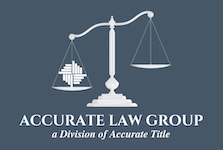One of the most rapidly expanding forms of cyber fraud in the real estate industry is seller impersonation fraud. This occurs when an individual attempts to impersonate the owner of a vacant or non-owner-occupied property in order to sell it. By utilizing public records, business email compromise, and perseverance, these fraudsters aim to deceive the Realtor, title company, and buyer into believing that they are the legitimate owner of the property and can sell it, all before the actual owner is even aware that their property is being sold.
You can be part of stopping this crime in its tracks.
FIRST – YOU HAVE TO KNOW THE TARGETS & RED FLAGS
- Is the property vacant land or even rental property? These types of properties are often targeted by seller impersonation criminals.
- Is the sales price lower than the average market value at the request of the “seller”? This is often done by seller impersonation criminals to attract a buyer quickly, before they get caught!
- Does the “seller” refuse to be at closing in person and specifically request documents sent to them so they can arrange their own notary public services? Although this is not uncommon in valid transactions as well, combined with the other red flags, this is often the closing method most preferred by seller impersonation criminals.
- Is all communication electronic and never in person? Although electronic communication is common in all transactions, if the seller is never available to meet or talk, combined with other red flags, this should raise the alarm!
WHAT CAN BE DONE TO STOP THESE CRIMINALS?
- Independently search for the identity and a recent picture of the seller.
- Request an in-person or virtual meeting, to see their government-issued identification.
- Be on alert when a seller accepts an offer below market value in exchange for receiving the payment in cash and/or closing quickly.
- Never allow a seller to arrange their own notary closing.
- Use a trusted title company or closing attorney to coordinate the exchange of closing documents and funds.
- We NOW require a copy of the seller photo ID BEFORE closing so we can match the name with the owner of record.
- If the property is vacant land or a non-primary residence for our seller, we immediately issue a letter to the mailing address of record on the tax card to “alert” the owner’s of the sale proceedings.
- If the Realtor has never met the “seller” in person, and they are requesting to NOT attend closing, Accurate Title will use our Remote Online Notarization closing softwares to provide a remote closing that requires a video call and involves ID verification and Knowledge Based Authentication questions (KBA’s) in order to insure seller identification.
- If a seller has signed remotely in any way, we will compare signatures obtained on our new documents against existing documents of record at the corresponding Registry of Deeds to confirm they match.
- All wire instructions provided (for example – for proceeds) are verbally verified by our team and NOT just accepted via email.
Seller impersonation criminals are getting more savvy and more bold. But if realtors and title companies work in tandem and do everything in our power to confirm the identity of our sellers, we can hopefully stop the criminals before any losses happen!


